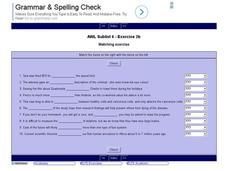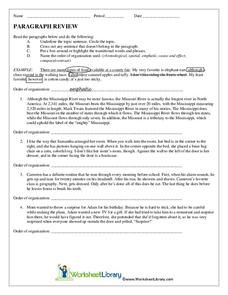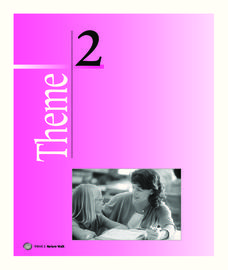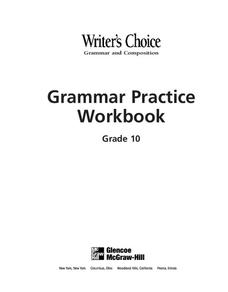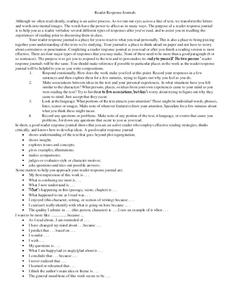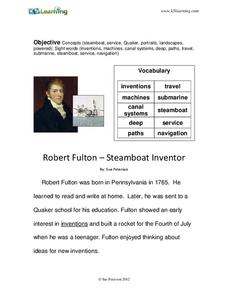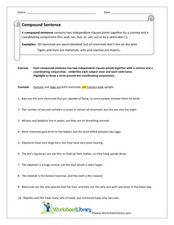Curated OER
ESL Advanced Level- English Grammar Cloze Worksheet
In this ESL open cloze worksheet, students fill in the blanks in 8 sentences. They use words related to English grammar, not vocabulary words, to fill each blank.
Curated OER
English Vocabulary Skills: AWL Sublist 6 - Exercise 2b
In this online interactive English vocabulary skills worksheet, students answer 10 matching questions which require them to fill in the blanks in 10 sentences. Students may submit their answers to be scored.
Curated OER
Statements and Questions
Teach your class the differences between statements and questions with a simple activity. After reading four statements, third graders rewrite the sentences as questions. They do the opposite in the last section. A helpful activity for...
Curated OER
Subject Object Pronoun Practice
Practice substituting subjects and objects in a sentence with the correct pronouns. A grammar worksheet prompts young learners to fill in the blanks for ten missing subjects, and then ten missing objects in different sentences.
Curated OER
Using Commas Correctly
Commas can be complicated. Help learners achieve a greater understanding of comma usage with this handout, which includes two different comma activities. Following given directions, young writers punctuate provided sentences and combine...
Curated OER
Gap Filling 4: Context Clues
Help your English learners strengthen their use of context clues in this straightforward worksheet. Twenty questions provide learners with multiple choices for completing several sentences. They choose the option that has the correct...
Curated OER
Past Simple / Past Participle : Irregular verbs
Here is a basic online interactive practice page for 10 common irregular verbs. Learners find the present tense forms in a word search, conjugate them in the past and past participle, and fill in the blanks with the correct past tense...
Curated OER
Paragraph Review
Use a instructional activity to help learners identify the topic sentence and transitional words. They eliminate sentences that do not belong in the paragraph and name the pattern of organization used. Great for homework or extra credit.
Curated OER
Fiction and Nonfiction
Your emerging readers know not to judge a book by its cover, but they can categorize these titles into either fiction or nonfiction. There are four book covers pictured here, and scholars record the titles under the corresponding text...
Curated OER
Idea Organizer
In this idea organizer worksheet, students complete an outline for their essay by filling in their topic, topic sentence, four subtopics, and three ideas supporting the subtopic.
LearnEnglishFeelGood.com
Participles Used As Adjectives
Is a movie interesting or interested? Use context clues to decide which participle would be the most appropriate in each of ten sentences.
K12 Reader
What Is an Adverb?
How, when, where, why. After a brief explanation of the types of additional information adverbs supply about verbs, kids circle the adverbs in a group of sentences and label the type of information provided.
Read Theory
Analogies 1 (Level 7)
Analogies are a great tool for teaching word relationships. For this instructional activity, learners complete 10 analogies using the bridge sentences provided to help them make the correct connections.
Read Theory
Analogies 2 (Level 6)
Activate analogy skills with a straightforward exercise. Learners complete 10 analogies, using the bridge sentences provided as support while they determine word relationships.
Read Theory
Analogies 3 (Level 8)
Engage your learners in analogies! Individuals use the provided bridge sentences and sentence frames to help them determine the relationships between words. They complete a total of 10 analogies.
Houghton Mifflin Harcourt
Nature Walk: Extra Support Lessons (Theme 2)
Reinforce concepts such as long vowels, spelling patterns, sound clusters, double-final consonants, and syllables with a nature-themed unit. Through a series of extra support lessons, learners compare and contrast using a Venn diagram,...
McGraw Hill
Grammar Practice Workbook
Make sure your pupils exercise their grammar muscles with this collection of worksheets. Organized into units, the packet covers everything from the parts of speech to sentence structure to punctuation.
Unified School District of De Pere
Reader Response Journals
Writing about and in response to what you read can help you process the text and lead to stronger analysis. Included here are four larger topics that students can write about, sentence starters to help pupils get started with their...
Kids Learning Station
Adjectives
Enhance your writing with describing words. After reading 12 simple sentences, learners circle the adjectives and underline the nouns they describe. Additionally, they write a few of their own sentences with adjectives at the bottom of...
Oxford University Press
Language Focus: Present Continuous, Imperatives
What will your class do in the future? What won't they do? Practice the present continuous form for future arrangements (or future progressive tense) with several fill-in-the-blanks and sentence reordering activities.
Teacher Web
Inferring Character Traits
Learning how to draw inferences from text is a key reading comprehension skill. Here's a learning exercise that gives readers a chance to practice by offering 20 descriptive sentences and asking kids to identify the inferred character...
K5 Learning
Robert Fulton – Steamboat Inventor
Examine the life of steamboat inventor, Robert Fulton, through reading comprehension worksheet that includes both multiple choice and short answer questions. Then, take part in a word search and write definitions, words, and sentences...
Curated OER
Compound Sentence
In this sentence structure worksheet, students review a definition and examples of compound sentences prior to responding to 10 questions that require them to label the parts of compound sentences.
Curated OER
Kinds of Sentences
In this sentence structure instructional activity, students respond to 22 short answer questions that require them to write and identify sentences as declarative, interrogative, imperative, or exclamatory.



